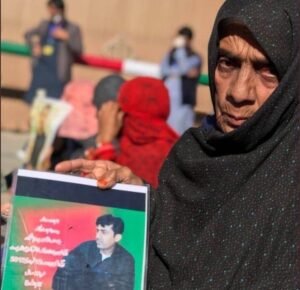The Forceful Return of Afghan Refugees and the Imperative for Comprehensive Support

A camp near the Torkham crossing, situated on the Afghanistan-Pakistan Durand Line, provides temporary accommodation for returnees before their journey back to Afghanistan. Photo: @private
By Ilhamuddin Afghan
Decades of relentless conflict and war have woven a tragic narrative for the people of Afghanistan. The plight of those who sought refuge in neighboring countries, such as Iran and Pakistan, unfolds as a tale of enduring suffering and hardship. The vast deserts of Pakistan, though a temporary haven, bore witness to their struggles, marking a painful chapter in their lives.
For those forced to return to their homeland, the challenges are multifold. The returnees, numbering over 350,000, face uncertainties about their future, caught in the limbo of temporary camps. Most re-enter Afghanistan through the Torkham border for the first time in their lives, where a makeshift camp offers little respite from the harsh elements. The scorching sun during the day and chilly nights force them into cramped tents, adding to their already arduous journey. After crossing the Torkham line, returnee families receive 15.000 Afs (around 200 USD) and settle in improvised camps before returning to their home districts and villages.
In his 40s, Sher Mohammad, once a handicrafts seller in Pakistan, embodies the struggles of many returnees. With no home or land, he finds it challenging to secure shelter for his eight children. His journey back to his native district, Tagab in Kapisa province, is fraught with the weight of memories, having been deprived of his homeland since the age of three.
Sadia, a 45-year-old woman, lives in a tent with her husband and six children, contemplating a move to the Khogyani district in eastern Nangarhar province. Her story reflects the complex web of familial disconnection, with no contact with her brothers for the past two decades. Saddened by the uncertainty of work and wages in her area, Sadia worries about the possibilities of sustaining life upon her return.
These individual stories paint a collective picture of anxiety and uncertainty among returning Afghan refugees. Unfortunately, the challenges don’t end with their arrival; they persist in their homeland.
Enhancing Taliban Policies for Returnees
The policies of the Taliban government come under scrutiny for lacking a comprehensive strategy for returnees. Experts emphasize the need for a clear procedure and legal framework that goes beyond mere rhetoric, actively enhancing the lives of these returnees while protecting their rights without discriminatory practices.
Mohammad Hassan, a social activist, stresses that the Taliban government must create an environment that ensures the all-round security, both physical and psychological, of the returnees. A clear policy is paramount, instilling in them the belief that Afghanistan is their secure home where their rights and possessions are protected. The absence of such measures leaves returning refugees vulnerable and adds to the complexities they face.
Psychiatrist Ahmadullah Bahman suggests addressing not only the physical but also the psychological impact of returning refugees. Beyond the immediate needs of shelter, food, and security, there is a pressing need for spiritual assurance. Health services, education, and training should be provided in a safe environment, acknowledging the unique challenges faced by both men and women in their journey to rebuild their lives.
“Afghan refugees encounter numerous challenges in foreign countries, with Pakistan being a notable example. It is imperative to address their essential needs, such as services, education, and training, within a secure environment. Until they can reintegrate into normal life, proactive measures must be implemented to ensure the provision of food and shelter for their well-being,” Bahman asserted.
The scarcity of resources and the stigma associated with seeking external assistance compound the challenges faced by returning refugees, particularly women and families. The Taliban government must work in collaboration with aid agencies to bridge these gaps, providing not just immediate relief but also fostering long-term sustainability for returnees.
Collaborative Reintegration for Afghan Refugees
Elias, an expert in cultural affairs, underscores the importance of providing timely updates and support to returning refugees. Awareness about their rights and privileges, along with support networks, is crucial for their successful reintegration into Afghan society.
The challenges faced by returning Afghan refugees are manifold, ranging from the immediate need for shelter and sustenance to the long-term goal of integration and sustainability. The Taliban government, aid agencies, and the international community must work collaboratively to provide comprehensive support, ensuring the physical, psychological, and economic security of returning refugees. Only through such collective efforts can the resilience of the Afghan people be honored, and the pathway to rebuilding their lives will be paved with hope and opportunity.
Ilhamuddin Afghan is a university professor based in Afghanistan.
Note: The contents of the article are of sole responsibility of the author. Afghan Diaspora Network will not be responsible for any inaccurate or incorrect statement in the articles.










